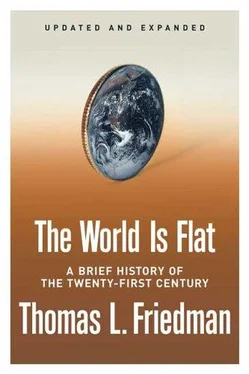The larger point here is this: Whether we are talking about management science or political science, manufacturing or research and development, many, many players and processes are going to have to come to grips with “horizontalization.” And it is going to take a lot of sorting out.
Where Do Companies Stop and Start?
Tust as the relationship between different groups of workers will have to I be sorted out in a flat world, so too will the relationship between companies and the communities in which they operate. Whose values will govern a particular company and whose interests will that company respect and promote? It used to be said that as General Motors goes, so goes America. But today it would be said, “As Dell goes, so goes Malaysia, Taiwan, China, Ireland, India...” HP today has 142,000 employees in 178 countries. It is not only the largest consumer technology company in the world; it is the largest IT company in Europe, the largest IT company in Russia, the largest IT company in the Middle East, and the largest IT company in South Africa. Is HP an American company if a majority of its employees and customers are outside of America, even though it is headquartered in Palo Alto? Corporations cannot survive today as entities bounded by any single nation-state, not even one as big as the United States. So the current keep-you-awake-at-night issue for nation-states and their citizens is how to deal with corporations that are no longer bounded by a thing called the nation-state. To whom are they loyal?
“Corporate America has done very well, and there is nothing wrong with that, but it has done well by aligning itself with the flat world,” said Dinakar Singh, the hedge fund manager. “It has done that by outsourcing as many components as possible to the cheapest, most efficient suppliers. If Dell can build every component of its computers in coastal China and sell them in coastal America, Dell benefits, and American consumers benefit, but it is hard to make the case that American labor benefits.” So Dell wants as flat a world as possible, with as little friction and as few barriers as possible. So do most other corporations today, because this allows them to build things in the most low-cost, efficient markets and sell in the most lucrative markets. There is almost nothing about Globalization 3.0 that is not good for capital. Capitalists can sit back, buy up any innovation, and then hire the best, cheapest labor input from anywhere into the world to research it, develop it, produce it, and distribute it. Dell stock does well, Dell shareholders do well, Dell customers do well, and the Nasdaq does well. All the things related to capital do fine. But only some American workers will benefit, and only some communities. Others will feel the pain that the flattening of the world brings about.
Since multinationals first started scouring the earth for labor and markets, their interests have always gone beyond those of the nation-state in which they were headquartered. But what is going on today, on the flat earth, is such a difference of degree that it amounts to a difference in kind. Companies have never had more freedom, and less friction, in the way of assigning research, low-end manufacturing, and high-end manufacturing anywhere in the world. What this will mean for the long-term relationship between companies and the country in which they are headquartered is simply unclear.
Consider this vivid example: On December 7, 2004, IBM announced that it was selling its whole Personal Computing Division to the Chinese computer company Lenovo to create a new worldwide PC company— the globe's third largest-with approximately $12 billion in annual revenue. Simultaneously, though, IBM said that it would be taking an 18.9 percent equity stake in Lenovo, creating a strategic alliance between IBM and Lenovo in PC sales, financing, and service worldwide. The new combined company's worldwide headquarters, it was announced, would be in New York, but its principal manufacturing operations would be in Beijing and Raleigh, North Carolina; research centers would be in China, the United States, and Japan; and sales offices would be around the world. The new Lenovo will be the preferred supplier of PCs to IBM, and IBM will also be the new Lenovo's preferred supplier of services and financing.
Are you still with me? About ten thousand people will move from IBM to Lenovo, which was created in 1984 and was the first company to introduce the home computer concept in China. Since 1997, Lenovo has been the leading PC brand in China. My favorite part of the press release is the following, which identifies the new company's senior executives.
“Yang Yuanqing-Chairman of the Board. [He's currently CEO of Lenovo.] Steve Ward-Chief Executive Officer. [He's currently IBM's senior vice president and general manager of IBM's Personal Systems Group.] Fran O'Sullivan-Chief Operating Officer. [She's currently general manager of IBM's PC division.] Mary Ma-Chief Financial Officer. [She's currently CFO of Lenovo.]”
Talk about horizontal value creation: This new Chinese-owned computer company headquartered in New York with factories in Raleigh and Beijing will have a Chinese chairman, an American CEO, an American CPO, and a Chinese CFO, and it will be listed on the Hong Kong stock exchange. Would you call this an American company? A Chinese company? To which country will Lenovo feel most attached? Or will it just see itself sort of floating above a flat earth?
This question was anticipated in the press release announcing the new company: “Where will Lenovo be headquartered?” it asked.
Answer: “As a global business, the new Lenovo will be geographically dispersed, with people and physical assets located worldwide.”
Sort that out.
The cold, hard truth is that management, shareholders, and investors are largely indifferent to where their profits come from or even where the employment is created. But they do want sustainable companies. Politicians, though, are compelled to stimulate the creation of jobs in a certain place. And residents-whether they are Americans, Europeans, or Indians-want to know that the good jobs are going to stay close to home.
The CEO of a major European multinational remarked to me, “We are a global research company now.” That's great news for his shareholders and investors. He is accessing the best brains on the planet, wherever they are, and almost certainly saving money by not doing all the research in his backyard. “But ultimately,” he confided to me, “this is going to have implications down the road on jobs in my own country-maybe not this year but in five or fifteen years.” As a CEO and European Union citizen, “you might have a dialogue with your government about how we can retain capabilities in [our own country]-but day by day you have to make decisions with the shareholders in mind.”
Translation: If I can buy five brilliant researchers in China and/or India for the price of one in Europe or America, I will buy the five; and if, in the long run, that means my own society loses part of its skills base, so be it. The only way to converge the interests of the two-the company and its country of origin-is to have a really smart population that can not only claim its slice of the bigger global pie but invent its own new slices as well. “We have grown addicted to our high salaries, and now we are really going to have to earn them,” the CEO said.
But even identifying a company's country of origin today is getting harder and harder. Sir John Rose, the chief executive of Rolls-Royce, told me once, “We have a big business in Germany. We are the biggest high-tech employer in the state of Brandenburg. I was recently at a dinner with Chancellor [Gerhard] Schroeder. And he said to me, ”You are a German company, why don't you come along with me on my next visit to Russia“—to try to drum up business there for German companies.” The German chancellor, said Rose, “was recognizing that although my headquarters were in London, my business was involved in creating value in Germany, and that could be constructive in his relationship with Russia.”
Читать дальше












